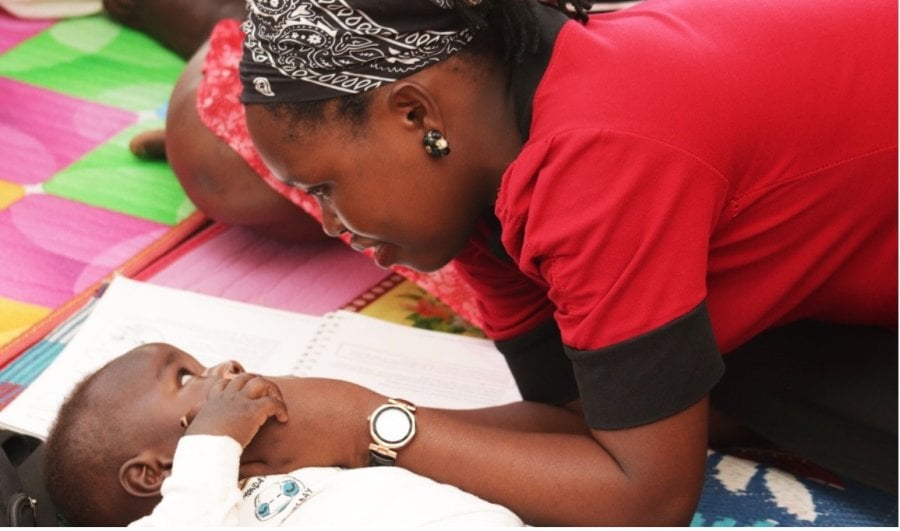‘Baby Ubuntu’ is a programme of early care and support for young children (0-3 years) with developmental disabilities and their caregivers. The programme sits under the ‘Ubuntu Hub’, a non-profit research and educational hub, based at the International Centre of Evidence in Disability aiming to improve the lives of children with developmental disabilities and their families. They are working closely with the World Health Organization (WHO) to support the development of the WHO Caregiver Skills Training programme for children 0-3 years with developmental disability and their families, using Baby Ubuntu materials.

Tell us more about the Ubuntu Hub:
‘Ubuntu’ is the African philosophy of togetherness, or a sense of “I am, because we are”, and is deeply rooted within cultural concepts of community and humanity in many countries and languages across Africa.
The Ubuntu Hub supports the development of three programmes; Ubuntu, which was previously called ‘Getting to Know Cerebral Palsy’ for children 2-7 years, Baby Ubuntu for children 0-3 years and Juntos for children with congenital zika syndrome and their families. All of the programmes are free to download on the Ubuntu Hub website.
The Baby Ubuntu programme aims to promote inclusion and participation of children with disability within the family and community, maximising a child’s developmental potential, optimising health and quality of life. The programme promotes empowerment of caregivers through information sharing and peer support, and aims to support shared maternal experiences, to address stigma and promote the human rights of children with disability.
Where do you work?
I am based in Uganda where I have been living for 10 years. I have been working with Baby Ubuntu since its inception in 2015 – I was part of the original group who designed and piloted the programme in Uganda. Since then, we have completed a feasibility trial and several mixed methods evaluations, with plan for a larger cluster randomised trial to start next year.
The Ubuntu Hub is supported by an online community of practice with over 300 members from 70 countries. Since the start the Baby Ubuntu programme we have reached more than 700 families across East Africa and has also been adapted for use in humanitarian settings in Afghanistan where it is known as the ‘Mighty Children’ programme. The original ‘Getting to Know Cerebral Palsy’ programme was developed and piloted in Bangladesh and Ghana before being widely used around the world. The Juntos programme runs primarily in Brazil and Columbia.
What does an Ubuntu caregiver support group look like? And what topics do you cover?
All the Ubuntu Hub programmes use a participatory approach to learning; making the sessions active and fun for the caregivers and children attending. We all learn together by sharing our experience and stories. The sessions are facilitated by a healthcare worker and an expert parent (a parent of a child with developmental disability). They attend a 5-day facilitator training and have ongoing mentorship to support them in running the groups.
Usually, 6-10 caregivers and their children meet together weekly or fortnightly in their local community. The Baby Ubuntu groups cover 11 modules: the first 2 modules look at understanding disability and your child’s development, then the next modules focus on developing practical skills around positioning, moving, feeding, play and communication, followed by modules focused on stigma (togetherness and belonging) and inclusion and participation at a community level.
Who are your collaborators?
We work with a broad range of implementation partners, largely in Africa. In East Africa we mostly work with non-governmental organisations (NGOs) and international NGOs who are identifying at risk children through their existing programmes but don’t have an intervention to provide early care and support for children with disability. In Uganda, where most of our research has been conducted, we work closely with the Ministry of Health to ensure the programme is integrated with government community health systems. In Rwanda, we work very closely with the Partners in Health Pediatric Development Clinic and the Rwandan Biomedical Centre. We are also fortunate to have been sponsored by several organisations including Saving Brains Grand Challenges Canada, Cerebral Palsy Alliance, The Tropical Health Education Trust and the Seneca Trust.
What are the biggest challenges / needs?
It is estimated that globally 53 million children live with a disability, with 95% living in low- and middle-income countries with little access to specialist services. It is vital that we raise awareness about disability at all levels; supporting individual carers to be empowered to better care for their children, promoting acceptance and inclusion at a community level and lobbying for community-based rehabilitation services to reach families in rural areas globally. We are fortunate that the Sustainable Development Goals (SDGs) have brought a renewed focus on early child development, but we really need to continue to leverage that if we are to ‘leave no one behind’.
How can someone get involved?
We are always excited to hear from people, partner organisations, researchers and students who are passionate about child disability! We also have opportunities for LSHTM MSc student summer projects. If you would like to find out more then please email me at Rachel.lassman@lshtm.ac.uk.
Where can we learn more about your work?
You can find out more about our programmes and download the free resources at https://www.ubuntu-hub.org/. You can also follow us on Twitter @BabyUbuntu or @CallyTann.
If you enjoyed this article and would like to build a career in global health, we offer a range of MSc programmes covering health and data, infectious and tropical diseases, population health, and public health and policy.
Available on campus or online, including flexible study that works around your work and home life, be part of a global community at the UK's no.1 public health university.



